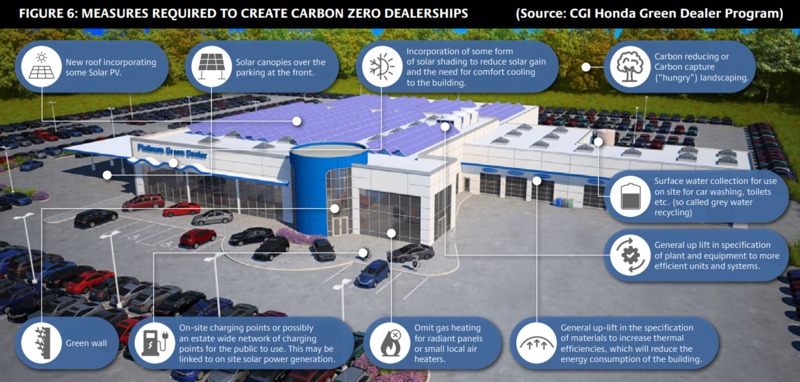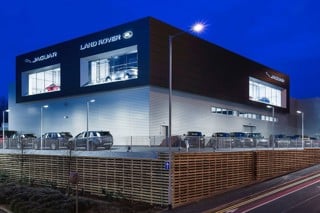Net zero car dealerships are at the forefront of an automotive sector push to achieve net zero status, according to a new report published by Automotive Property Consulting (APC).
Although APC acknowledged in its ‘Car Dealerships: leading the charge to Carbon Zero’ report that electric vehicles (EV) are currently the main focus for manufacturers and the UK Government, it said that the legislative spotlight will increasing fall on property.
But car retailers were told that sustainable measures such as rooftop photovoltaic panels, solar thermal panels, thermal pumps, LED lighting, green facades or rainwater reuse systems will not only reduce emissions and costs in the long-term, but reduce the risk of potential fines and increase property values.
“Features like these do induce significant cost, and it is unclear whether dealers are likely to receive financial support from the manufacturers towards retrofitting dealerships with such initiatives” said the APC report.
“However, creating carbon zero dealerships is very much possible and the opportunity therefore presents itself to the automotive industry to be at the forefront of change.
“There is clear evidence dealers and manufactures are now looking beyond electrification in leading the charge to net zero.”
Property’s carbon cost
APC said that the “built environment” accounts for a 40% share of global greenhouse gas emissions and the transport sector close behind at 24% (55% of which coming from cars).
As such, it stated that dealership property is the biggest conduit for the implementation of change and is likely to lead the way throughout the journey to net zero for commercial property.
 Dealer standards are likely to increasingly reflect the push for net zero of their OEM partners, according to APC.
Dealer standards are likely to increasingly reflect the push for net zero of their OEM partners, according to APC.
Almost two thirds (62%) of OEMs have stated they have developed comprehensive sustainable strategies (SMMT), with Toyota setting a net zero target of 2050 in line with government timescales and Volvo aiming for 2040.
Toyota has requested that all its dealers take part in a ‘Green Dealer Survey’ which aims to assimilate data on the levels of sustainability within the dealership network, APC said.
AM has recently reported on car retailers retrofitting LED lighting to their properties in order to reduce carbon emissions and long-term costs, including Swansway Group and Rygor.
A recent News Insight feature, meanwhile, highlighted the measures taken by car retail businesses to reduce energy usage amid rising costs for gas and electricity.
APC’s report highlighted the ‘gold standard’ of a BREEAM excellent score for carbon efficiency, and said that Kia Coulsdon, Volkswagen Coulsdon, Audi Coulsdon and Volkswagen West London were among those to achieve the rating.
Tightening legislation
As well as OEM standards, legislation is also dictating the shift to net zero.
From April 2018, it became unlawful to let properties with an Energy Performance Certificate (EPC) rating of F or G, the lowest grades of energy performance ratings.
Restrictions will further tighten from April 2023 when existing commercial leases and landlords will not be permitted to continue to let properties with an F or G rating unless a qualifying exemption is registered.
APC said that it was likely that the government is going to impose further MEES regulations where, by 2030, commercial properties will be required to have an EPC rating B or above before being let.
New developments are coming under pressure from the NPPF (National Planning Policy Framework) to deliver sustainable developments, with a focus on GI (Green Infrastructure) and “urban greening”.
APC’s report said: “The majority of this has occurred within the jurisdiction of the London Plan for major development proposals including measures such as high-quality landscaping (including tree planting), green roofs, green walls, and nature based sustainable drainage.”
Increasingly, property values and rents are being influenced by sustainable measures.
APC acknowledged that there has been a notable shift in focus towards ESG (Environmental, Social and Governance) by property investors and valuers.
It said: “Valuers are now either consistently applying ‘green premiums’ to buildings with notable levels of sustainability or ‘brown discounts’ which factor in expenditure required or will be required to bring the property up to standards.”
To download APC’s ‘Car Dealerships: leading the charge to Carbon Zero’ report, click here.

















Login to comment
Comments
No comments have been made yet.